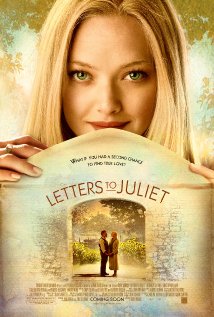I have been wanting to watch the movie “Letters to Juliet” for some time now (knowing full well that it would be a tear jerker) and I finally created the opportunity for myself this week – I wasn’t disappointed.
The movie is about an American girl, Sophie, (Amanda Seyfried) on vacation in Italy who finds an unanswered “letter to Juliet” – one of thousands of letters left at the fictional lover’s Verona courtyard, which are typically answered by a the “secretaries of Juliet”. The letter, written by Claire (Vanessa Redgrave) 50 years earlier drives Sophie to respond on behalf of Juliet and this triggers a quest to find the two lost lovers referenced in the letter.
Apart for being a moving story about lost love, the movie also brings to light something that many of us have probably spent much energy and time contemplating, – “What if?”
In the movie Sophie writes: –
“What” and “If” are two words as non-threatening as words can be.
But put them together side-by-side and they have the power to haunt you for the rest of your life:
“What if?”, “What if?”, “What if?”
How many times have you spent time wondering “What if?” “What if I hadn’t left that job?”, “What if I hadn’t started that business?”, “What if I hadn’t left that relationship?”, “What if I lose my job?”, “What if she leaves me?” and so on.
Research outlined in the Harvard Gazette late last year by Harvard University psychologists Matthew A. Killingsworth and Daniel T. Gilbert, found that “A human mind is a wandering mind, and a wandering mind is an unhappy mind.”
Killingsworth and Gilbert also found that nearly 50% of our time is spent thinking about something other than what we are doing and that “while the ability to think about what is not happening appears to be a cognitive achievement, it comes at an emotional cost.”
Unlike other animals, we spend a lot of time thinking about what isn’t going on around us, contemplating events that happened in the past, experiences that might happen in the future, or may never happen at all. The “What if” distraction, in many instances, is our default mode of operating and is also our downfall.
The “What if’s” we contemplate about the past are usually laced with regret or anger while the “What if’s” we contemplate about the future can be riddled with fear.
During times when we have thoughts that swing from the past to the future and back again, reflecting and imagining, our minds can touch on dozens of ideas a minute. We are either digging in the past reliving negative decisions and experiences or ‘awful-ising’ what could happen in the future. Our emotions become slaves to our thoughts, and in turn we become slaves to our emotions.
By far the biggest problem with having thought patterns that swing from the past to the future is that we are never in the present moment. Rarely do we rest in the moment, which is where we need to be to realise our potential.
James Thurber said “Let us not look back in anger, nor forward in fear, but around in awareness.”
Most of us can understand this intellectually, but putting it into practice is another thing all together. It’s a learned behaviour, one that must remain a constant part of our awareness if we hope to be who we want to be.
Like anything, we can choose to keep our minds focused on the present moment. Lately, I realise when I wander away from what I am doing much quicker than I used to. I am more aware now of how my past keeps creating my future and when I am conscious of this I get to make another choice, I get to let go of the past and embrace the now.
Take care until next time…
Helen




